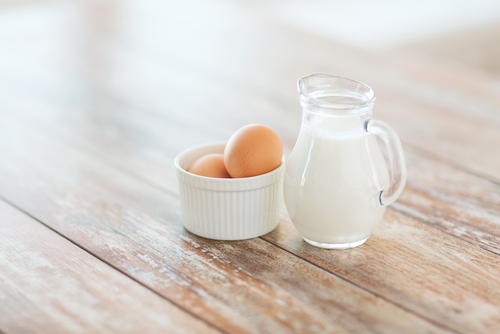Yogurt has always been a favorite in most American households. This protein-rich food is not only a great help to our digestive systems and gut health but also has various nutrients that assist in the general functioning of our bodies.
From its appearance, consistency, and composition, many people usually believe it must contain some eggs in its ingredients.
But does this super-food really contain any eggs? Simply put, yogurt is fully dairy, and has no eggs in it. It is a safe food option for people that are on eggless diets.
Read on to find out more about yogurt ingredients.
Are There Eggs in Yogurt?
Yogurt is fermented milk through the process of bacteria introduction. Depending on the type of yogurt, other various ingredients will be present, but milk is the fundamental component of the food.
Because of the yogurt-making process, eggs are not and should not be added to this dairy product.
It is important to, however note that some yogurt containers may have traces of eggs that may accidentally happen during the line of production.
Therefore, always read the yogurt label before purchasing or consuming it.
Basic Yogurt Ingredients
As we have already seen, yogurt is just fermented or cultured milk. The fermentation process happens thanks to gut-friendly bacteria introduced to the milk to turn it into the thick, sour, semi-drink that we all love.
So what truly is in a cup of yogurt?
Before we answer that, it is good to mention that various types of yogurt come about due to different manufacturing processes.
For example, the most common yogurt variation is Greek Yogurt which is only different from plain yogurt because of the milk-straining levels.
Greek Yogurt is thicker (with less water), has less lactose, and is generally healthier than plain yogurt.
Other types of yogurt include:
- Australian Yogurt
- French Yogurt
- Icelandic Yogurt
- Lactose-Free Yogurt
- Drinkable Yogurt
The two main ingredients in yogurt are milk and bacteria. The bacteria change the lactose sugars present in plain milk to lactic acid, which is what we call yogurt.
When making yogurt from home, you can purchase the bacteria (or starter) online or from a local grocery shop near you.
Yogurt milk mostly comes from cows, but goat, buffalo, and even camel milk can be used.
The milk can also be pasteurized or raw. Different types of milk produce different types of yogurt that will mostly differ in texture and taste.
Lastly, yogurt can also have extra ingredients, including sugar, flavors, and toppings like fruits, nuts, and spices.
Can You Eat Eggs and Yogurt Together?
If you do not have an allergy to either eggs or yogurt, then it is perfectly fine to eat the two together.
Most people worry that the live bacteria in yogurt might react with eggs causing a stomach upset. However, there is no scientific evidence to support such claims.
While yogurt is a great source of good digestive bacteria, eggs provide protein for your body therefore, a combination of the two would benefit your body.
PS: Eating yogurt and eggs together is a great breakfast option for people following a low-carb, high-protein diet.
Is Yogurt a Good Source of Protein?
Yogurt, being a dairy product, is a great source of protein and other nutrients such as calcium and vitamins.
For every 8 ounces of regular yogurt, you get 12 grams of protein, making yogurt a high-protein food.
Greek yogurt, on the other hand, generally contains more nutrients than plain yogurt, and this applies to protein levels as well.
For instance, for every 7 ounces of Greek yogurt, one gets 20 grams of protein.
Yogurt Nutritional Value
Yogurt is an effortlessly healthy food that contains several nutrients which make it wholesome and healthy.
Below is a summary of yogurt’s nutritional contents per 100 grams:
| NUTRIENT | AMOUNT | UNIT |
| Water | 85.1 | g |
| Protein | 5.25 | g |
| Fats | 1.55 | g |
| Carbohydrates/Sugars | 7.04 | g |
| Calcium | 183 | mg |
| Phosphorous | 144 | mg |
| Potassium | 243 | mg |
| Cholesterol | 6 | mg |
| Energy | 265 | kj |
| Fiber | 0 | g |
| Caffeine | 0 | g |
Table Reference: usda.gov
Is Yogurt Considered Dairy?
Dairy is any food, liquid or solid, made from or of mammalian milk, including cheese, butter, and yogurt. Therefore, yogurt is considered dairy.
Read Also: Does Mayo Have Gluten? (Basic Mayo Ingredients Explored)
Is Yogurt Healthier than Eggs?
The answer to this question is quite complex because the lens used to look at the two foods determines which one is healthier than the other.
For example, when it comes to protein provision, both foods are amazing sources of animal protein. However, some people cannot eat eggs thanks to their religious beliefs and sometimes allergies, but can have dairy. In such a case, yogurt may be seen as healthier.
The opposite is also true for people with lactose and general dairy restrictions.
Regarding minerals such as iron, Vitamin B and D, omega-3, and carotene, eggs contain higher amounts of these than yogurt.
However, eggs have a higher amount of cholesterol (though good) compared to yogurt.
Eggs have less sugar than yogurt.
Overall, we can therefore say that both foods are independently healthy, and each has or lacks one or two things synonymous with the other.

